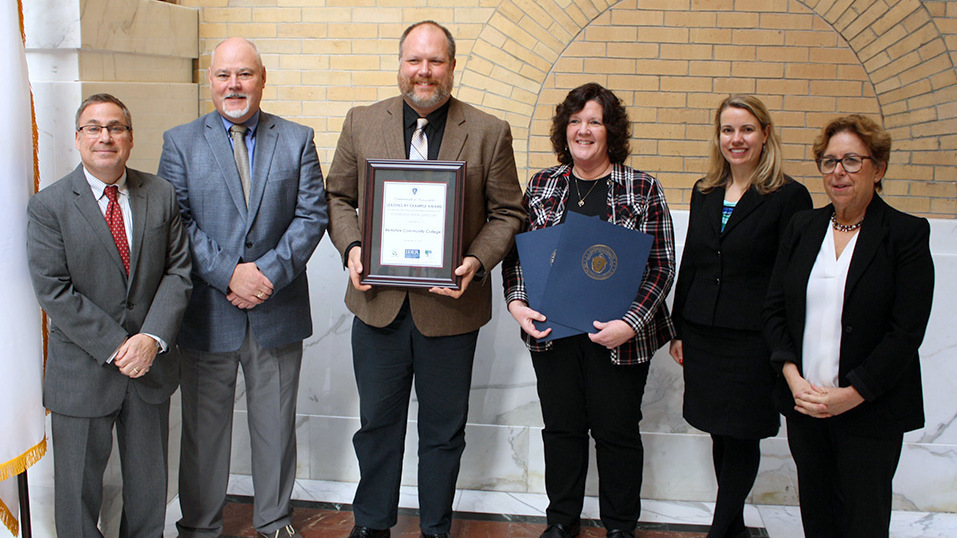
Berkshire Community College Wins Prestigious Sustainability Award
PITTSFIELD, Mass. — Berkshire Community College was one of eight state organizations that was recognized at the 13th annual Leading by Example awards for clean energy initiatives in public higher education in the commonwealth by the Massachusetts Department of Energy Resources.
The Leading by Example program is administered by the Department of Energy Resources and works collaboratively with state agencies and public colleges and universities to advance clean energy and sustainable practices that reduce the environmental impacts of state government operations. The awards were presented at a State House ceremony by DOER Commissioner Judith Judson and Division of Capital Asset Management and Maintenance Commissioner Carol Gladstone.
"What an exciting day today," said Ellen Kennedy, BCC's president. "Our efforts with renewable energy, composting, recycling and, frankly, our culture of commitment to sustainability through sustainable practices and a sustainability mindset are reflected in the decision to recognize the College for this prestigious honor."
BCC received a recognition award for clean energy, waste reduction and additional sustainability initiatives, including the installation of solar PV that generates the equivalent of 20 percent of campus electricity consumption, achieving an 81 percent waste diversion rate, and second place nationwide in the Recyclemania program through significant composting and recycling programs, a deep retrofit of the Hawthorne/Melville to meet LEED Silver standards, and more.
Much of this work couldn't have been done without the collaborative effort of the Green Team, the group on campus dedicated to reducing the college's carbon footprint, improve sustainable practices, and collaborate with other colleges and institutions.
"Since joining the Green Team, I have already been able to make a difference on my campus," said Brennah Brickle, freshman environmental science major at BCC. "I had the idea to start a work-study program where I assist and educate students and staff on how to properly dispose of their waste into the correct bins in the cafeteria. The Green Team was receptive of the idea and I went to work from there, seeing a significant change in our waste diversion immediately."
These efforts have not been for nothing. According to the facilities department, the day Brennah began working in the cafeteria, they saw a notable increase in the amount of correctly composted and recycled materials and decrease in the amount of waste going to landfills. This effort in conjunction with other initiatives on campus should put BCC on track to reach the goal of a 90 percent waste diversion rate and become number one in the country in the RecylceMania competition this year.
"At BCC we understand that is necessary to make changes in our daily routine so that we reduce our waste output and energy usage. The Green Team meets regularly to discuss and implement ideas and strategies across campus. Students, administration, faculty and staff all work together on green-minded actions and in doing so we set an example for our students and community members. We are very proud of our composting, recycling and energy reduction efforts," said Travis Costello, Green Team member and liberal arts major, class of 2020.
Tags: BCC,















